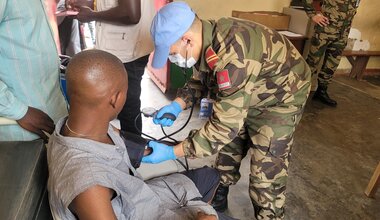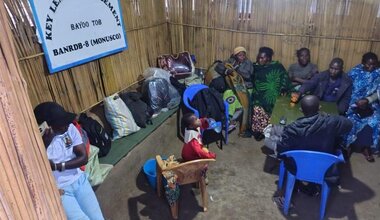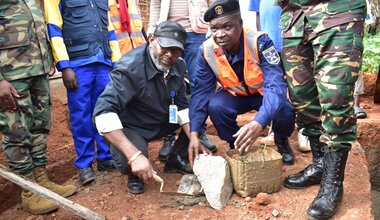Goma: MONUSCO trains law students in child protection
In a context marked by decades of armed conflict that have profoundly affected civilian populations in North Kivu, particularly children, MONUSCO, through its Child Protection section, organized a two-day training session for around fifty law students from the Catholic University La Sapientia (UCS) in Goma.
Under the theme of child protection in armed conflicts, this session, held from September 2-3, 2025, aims to raise awareness among these future lawyers about the United Nations agenda on Children and Armed Conflict (CAAC) and to strengthen their understanding of legal and humanitarian mechanisms for protecting children's rights in war contexts.
Children in the DRC continue to pay a heavy price for conflicts: recruitment into armed groups, forced displacement, sexual violence, loss of loved ones, attacks on schools, and exploitation in mines. These grave violations are what students learned to identify, document, and combat through law and international protection instruments.
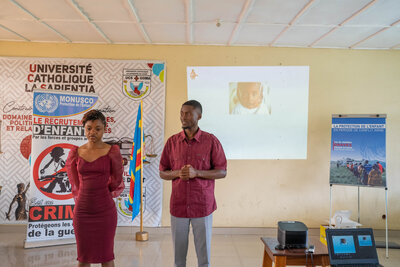
Télesphore Kanyamulera, assistant in MONUSCO's Child Protection section, emphasized the importance of such an initiative: "Teaching child protection means building the foundations of a more just society, where the fundamental rights of the most vulnerable are respected."
He added that this approach helps make future lawyers accountable: "Peace is not built solely through weapons, but also through education, law, and community engagement."
Rich and Interactive Content
During this training, participants explored national and international legal frameworks such as the UN Convention on the Rights of the Child, adopted in 1989, and relevant UN Security Council resolutions, whose implementation in the DRC is supported by MONUSCO.
The modules also covered the respective roles of MONUSCO, national institutions, NGOs, and humanitarian organizations in monitoring, prevention, victim assistance, and reintegration of children affected by war.
According to Mathieu Ndongo Koni, deputy head of MONUSCO's Child Protection section, the objective is clear: "We discuss the specific challenges and opportunities we have in this work and the role that students can play as contributors to the search for peace when they are well-trained and have understood the scope of children's rights and the necessity to protect children."
He also highlighted the interconnection between the three UN agendas: "I must point out that there are three intersecting UN agendas: one on youth, peace and security; another on women, peace and security; and our agenda on children and armed conflict. They intersect. And we believe that educating students about children's rights is simply educating them about peace."
Several students testified to the importance of this initiative in their eyes. "This is the first time I've attended training so focused on child protection. I understood that law can truly be a tool for social transformation," confided Victor Tuver, 24, a Master's 2 student in environmental law.

Gloria Lobela, also in Master's 2, added: "I had already heard about children's rights. Today I learned concrete things about the disarmament of child soldiers."
For his part, their classmate Janvier Irumva Muyoboke evoked the dramatic situation of children in Rubaya mines, calling for mobilization: "Personally, I grew up in Rubaya [Masisi territory] and some of my classmates from that time are no longer alive today because they had to leave school benches to join the mine. Children's place is not in mines, it's in school. I would like to raise awareness among families and communities through community radios."
Youth Committed to Peace
Following this first session, similar training programs are already planned at the University of Goma (UNIGOM) and the Free University of the Great Lakes Countries (ULPGL), thus consolidating a lasting partnership between MONUSCO and local academic institutions.
François Sobo, from MONUSCO's Justice Support section, emphasized the program's ambition: "Our presentation focuses on justice procedures, accountability, and reparations for crimes committed against children in conflict zones. The purpose of this initiation is for these young people to be aware of existing legal mechanisms."
Through this initiative, MONUSCO and La Sapientia University demonstrate that educating for peace begins by making people understand that every child has the right to dignity, protection, and a future.
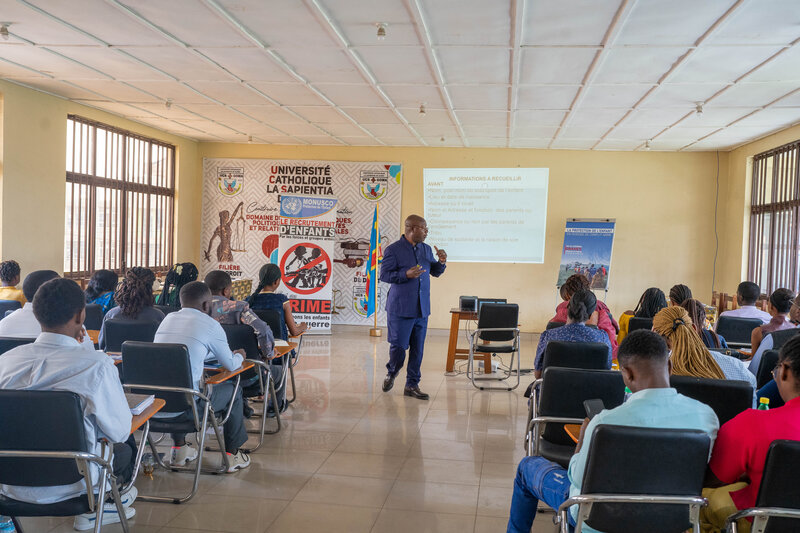
 UN
UN United Nations Peacekeeping
United Nations Peacekeeping




